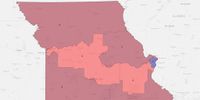The battle over congressional redistricting has erupted into a high-stakes, coast-to-coast political showdown, as California and Missouri become the latest battlegrounds in an increasingly nationalized struggle for control of the U.S. House of Representatives. With accusations of democratic subversion, eye-popping campaign spending, and fiery rhetoric invoking the specter of authoritarianism, the debate is drawing in political heavyweights, legal experts, and grassroots activists alike.
In California, Governor Gavin Newsom has launched an aggressive campaign supporting Proposition 50, a ballot measure that would temporarily replace the state’s independent redistricting commission with a process allowing Democrats to draw new congressional maps for the 2026, 2028, and 2030 elections. According to The San Francisco Chronicle, Newsom’s campaign went live on September 1, 2025, with a blitz of video ads on social media and television, some of which draw a direct comparison between former President Donald Trump and Adolf Hitler. The ads accuse Trump of "following the dictator’s playbook" and launching a "blitzkrieg"—a term historically associated with Nazi military tactics—by "arresting people without warrants, targeting the free press, attacking universities."
“Now he’s coming directly for our democracy with a scheme to rig the next election. You have the power to stop him,” the narrator warns in one spot, as reported by The Downballot. Another ad features California redistricting commissioner Sara Sadhwani, who appeals to voters to pass Prop 50, arguing it “will put the election back on a level playing field by giving the people the power to approve emergency maps to counter Trump’s power grab.” Sadhwani, once skeptical of Newsom’s plan, now stands among several former critics who have changed their tune, reflecting the shifting alliances and high stakes of the fight.
At the heart of the California measure is a response to recent GOP-led redistricting in Texas, which, at Trump’s urging, redrew congressional maps to flip five seats from Democrats to Republicans. Newsom and his allies frame Prop 50 as a necessary counterweight, contending that failing to act would leave California—and by extension, the nation—vulnerable to a Republican House majority that could serve as a rubber stamp for Trump. “If Democrats flip the House, they would create a check on Trump’s power,” the campaign argues, as cited by The San Francisco Chronicle.
The campaign for Prop 50 has reported nearly $16 million in donations, drawing support from national Democratic groups and major California donors. According to state campaign finance filings, the top contributors include the Washington, D.C.-based House Majority PAC ($3.5 million), the California Teachers Association ($3 million), Netflix founder Reed Hastings ($2 million), and $2 million transferred from Newsom’s 2022 gubernatorial campaign. More than $5 million has come from outside California, underscoring the national implications of the fight.
But the opposition is formidable. The "No on Proposition 50" campaign is funded almost entirely by Charles Munger Jr., a wealthy Palo Alto physicist and Republican donor who contributed more than $20 million to defeat the measure. Munger previously funded the 2010 ballot initiative that established California’s independent redistricting commission. His side’s ads avoid direct references to Trump, instead warning that Prop 50 is “a direct attack on democracy” and “tears away the power of choice.” Mailers from the opposition campaign feature quotes from pro-democracy groups like Common Cause and the League of Women Voters—organizations that initially opposed Prop 50 but have since softened their stance—adding to voter confusion.
“We cannot save democracy by burning it down in California,” the opposition mailers declare. Munger’s campaign has reserved nearly $10 million in ad time, according to AdImpact, dwarfing the $3.6 million spent by the pro-Prop 50 side as of late August. The disparity highlights the unlimited fundraising potential of ballot measures, which are not subject to the same contribution limits as candidate races in California.
Newsom, for his part, has intensified his criticism of Trump, shifting to a more mocking tone on social media and warning in interviews that Trump is “destroying American democracy.” The governor’s name appears in legal disclosures at the end of the ads, though he is absent from the first two spots. A third ad, released September 2, features Newsom speaking at the campaign’s first rally—a highly publicized event that drew the attention of Border Patrol officers outside.
Prominent California Democrats, including San Francisco Supervisor Bilal Mahmood and Mayor Daniel Lurie, have voiced support for Prop 50, though not all plan to campaign actively for it. The measure’s fate will be decided in a special election on November 4, 2025, with California’s status as the nation’s most populous state and largest congressional delegation lending the contest outsized national significance.
Meanwhile, in Missouri, Republican Governor Mike Kehoe has called a special legislative session, also beginning September 3, 2025, to adopt a new congressional map designed to flip the state’s 5th District from Democratic to Republican control. As reported by The Downballot, the proposed map would split Kansas City into three districts, each solidly Republican, effectively dismantling the reliably blue 5th District. Based on 2024 election results, Donald Trump would have carried the new 5th by a 58-40 margin.
Democratic Representative Emanuel Cleaver, who currently represents the 5th District, condemned the move as “an unconstitutional attack against democracy.” In a statement cited by The Downballot, Cleaver said, “President Trump’s unprecedented directive to redraw our maps in the middle of the decade and without an updated census is not an act of democracy – it is an unconstitutional attack against it. This attempt to gerrymander Missouri will not simply change district lines, it will silence voices. It will deny representation.” Cleaver pledged to challenge the map in federal court, though he acknowledged that state courts—despite being dominated by Republican appointees—have at times acted as a check on GOP power grabs.
Missouri Republicans are also considering a constitutional amendment to make it harder for citizens to pass future amendments. The proposal would require a majority vote both statewide and in every congressional district, a move critics say would effectively gerrymander the ballot initiative process itself. Such a rule could run afoul of the "one person, one vote" doctrine, as it would make some votes count more than others depending on geography.
Opponents of the new map are weighing a "veto referendum," a process with precedent in Missouri. In 2018, labor unions successfully used this mechanism to overturn a "right-to-work" law at the ballot box. If enough signatures are gathered, the map would be suspended until voters decide its fate in an election—a tactic also being considered by Ohio Democrats facing similar GOP gerrymandering efforts.
The redistricting battles in California and Missouri are unfolding against a backdrop of nationwide legal and political fights over the future of American democracy. In Texas, Governor Greg Abbott recently signed a new congressional map that civil rights groups allege violates the Voting Rights Act by diminishing Black and Latino voting power. In Alabama, Republicans are appealing a federal ruling ordering them to redraw their Senate map for similar reasons. Legal challenges are mounting across multiple states, with outcomes that could shape the political landscape for years to come.
As the special elections and court battles approach, voters in California and Missouri find themselves at the epicenter of a bitter contest over who gets to draw the lines—and, ultimately, who gets to decide the direction of the country. With millions of dollars pouring in, starkly contrasting visions of democracy on display, and the stakes as high as they come, the outcome of these fights could reverberate far beyond state borders.
In the end, the struggle over redistricting is more than a technical debate about maps and districts—it’s a fight over the very rules of American political engagement, and perhaps, the future of representative government itself.




